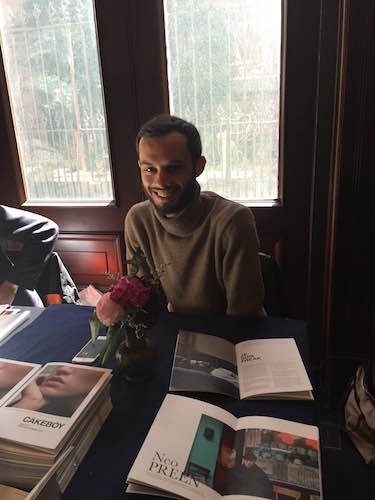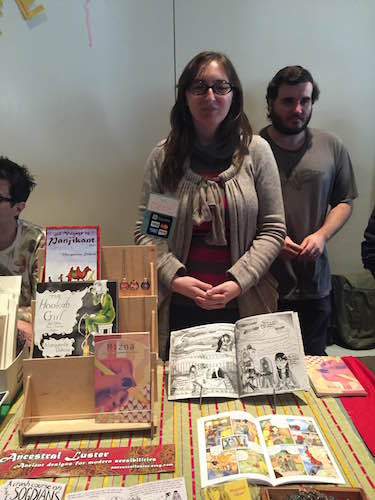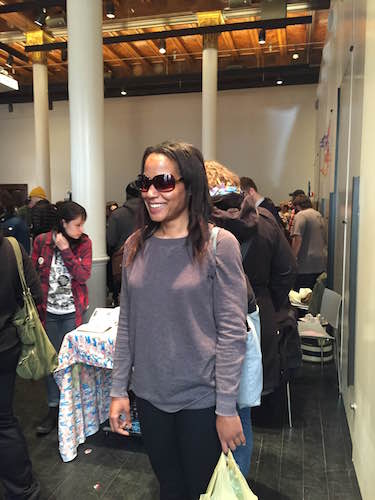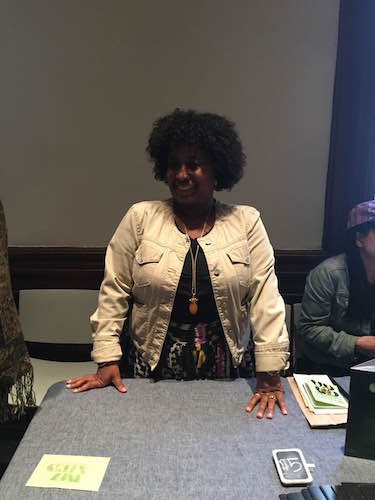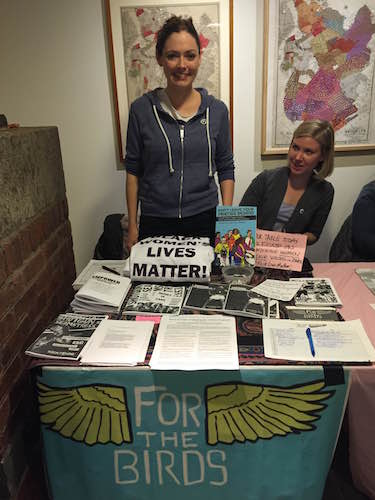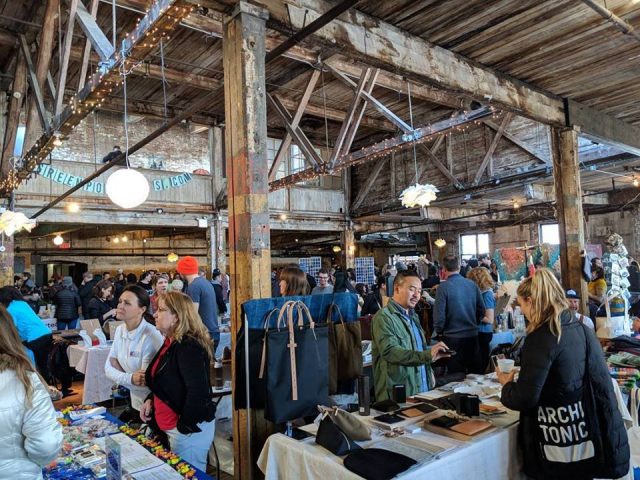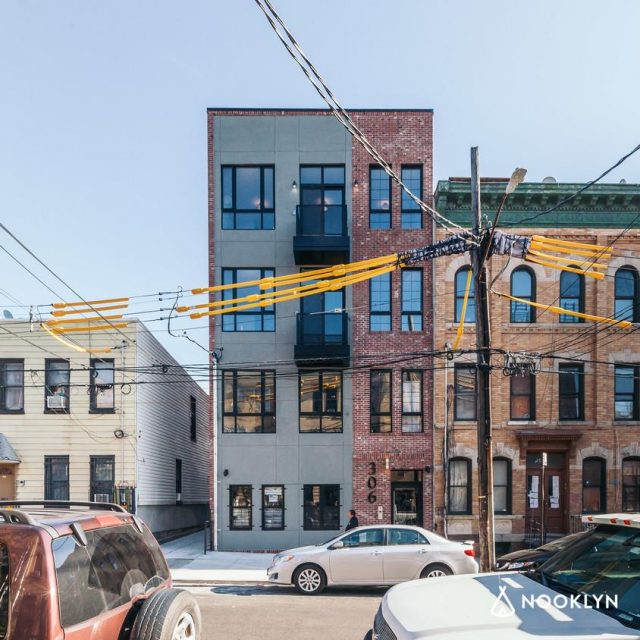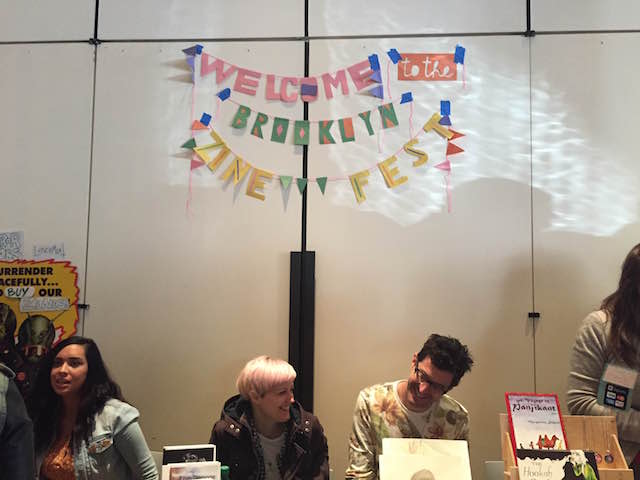
This past weekend, the Brooklyn Historical Society played host to the annual Brooklyn Zine Fest, drawing zinesters and their fans from around the city and across the county. The event this year continued to be so popular that it spilled into a second day, with 75 zine publishers tabling each day. As in past years, event organizers Matt Carman and Kseniya Yarosh have combined this gathering of the zine community with several panels that investigate the current state of the zine medium. One panel, “Black Lives Matter: Zines and Activism,” sparked interest, and generated conversations (and controversy) around zines that engage in political or social commentary.
While zines as a form are rooted in political commentary, modern zine publishers engage with these issues in a variety ways. In the 1990s, the internet seemed to sound the death knell for zines, with many zinesters moving online to blogs. But the medium has seen a resurgence in recent years as an alternative to digital media. This resurrection has recast community norms. As zines have taken on new roles and new readers, politically minded self-publishers have adapted and transformed. In order to learn more about these modern social commentators, we asked some of the zine publishers at the Zinefest about the ways they engage social and political issues.
Shawn Santiago is the writer and publisher of Cakeboy, a new magazine about queer identity and self-expression. Santiago is currently a one man show and was at Zinefest to promote the zine’s debut spring issue.
Can you tell me about your zine?
My zine is Cakeboy. It takes the structure of a men’s fashion magazine, but gets a little bit more political and thoughtful. It’s less for men and more agender, but I wanted to make something that deals with masculinity. [It deals with] how people engage or parse through masculinity, and what that means. That’s the lengthy elevator pitch. In the end, it started because I had a blog. I was into fashion, but fashion blogging wasn’t my passion. So I started the zine off of that format.
You mentioned the political side of Cakeboy. How do you find zines as a medium are different for that material, as opposed to blogs?
I wanted to do interviews and engage with people I knew who had interesting stories. One of my bigger features is with a friend of mine, who is an immigrant. He had not only his story as an immigrant to tell, but also his story as a designer working with textiles to tell. It was just bigger. I think a reader would engage with his story better in print. As a medium [print] is a bit more complicated. I’d rather people pick it up, earmark it, and come back to it, than breeze right through it on their phone and only get half the picture.
As much as the internet can be good – some people might see a tweeted link and read it – I think this is a nicer way to deal with peoples’ identities in a multifaceted way. Someone who’s an immigrant and a queer person and a designer has all these different things to say about who they are. I think that’s just better in print because you can sit down with it. A lengthy conversation can happen. The photos are there make people consume that material in a specific context, rather than getting it piecemeal through Pinterest or however the hell you get information online.
_____________________________________
Marguerite Dabaie is the author of several zines, including The Hookah Girl. Though she had to watch her booth during the panels, she showed her support all the same with a placard on her table that read, “Black Lives Matter.”
Can you tell me about your zines?
One of my comics is an autobiography about Palestinian Americans called The Hookah Girl. I have another comic about the Silk Road, which is a historical fiction called A Voyage to Panjikant.
What do you think about zines as a medium for political or activist material?
I don’t think there’s any way to avoid it. Zines started out as activist material. That’s just the nature of the medium. I feel that way about zines, but I feel that way about a lot of things. There should be avenues open for politics in anything – books, comics, movies. In anything you need to have that discussion.
Do you think there’s something unique about the production or the community that makes zines different than those other media?
Zines have evolved and changed so dramatically. It’s gone through a resurgence, but it started out as this activist thing with a DIY aesthetic. Then it kind of died. Now zines are back, and hooray, but the nature of them has changed. I’d personally like to go back to those DIY roots, but at the same time I think it now has a different texture that should be embraced.
I self-publish a lot. Hookah Girl is about Palestinians. If I try to go by traditional publishing avenues, people just see “the P-word” and won’t touch it. Because of that, I just self-publish. That gives you the freedom to say whatever you want to say. I think that should be embraced. I’m not saying every self-publisher of zines has to be super political. But there should be that option available.
_____________________________________
Simone Bailey is an educator, Black Lives Matter activist, and a zine creator. Though she did not promote her own material at Zinefest, Bailey was a panelist on the Black Lives Matter panel.
Can you tell me a bit about your involvement with zines?
The project I’m working on now is called Intervals. It’s actually a series of small publications like zines focused on interviews. My portion is interviews with artists who have perspectives outside the mainstream in some way, whether that’s coming from a cultural position, an ideological position, a class position, sexuality, whatever.
What about zines makes them a great medium for identity politics in particular, or any sort of political messaging? Is it something about the production? Or maybe something about the community?
I think it’s the process of making something and the process of building a larger community. That’s what I see zines as working towards: building a larger community around whatever you’re working on. It’s something that doesn’t happen in the same way online. You can get thousands more people, ten times as fast as sending something through email. But I do think there’s something to the tactility, in writing people letters, in taking the time to slow down and engage with their ideas in that way, that makes those types of interactions stronger.
When I first moved to New York, the first person I called was someone I traded zines with in the mid-80s because we managed to stay in touch, even though it’s not at the same frequency [as a connection online.] There’s something more intimate in that kind of exchange.
Are you active on these same issues in other ways or are zines your primary outlet?
So, as an artist there was a limitation to my work. [I would] make visual material, but then [I had to] depend on a writer to [understand it] when they saw it and write a good review to capture the expression behind [the work]. That’s why for the interviews I wanted to talk to artists who were doing things I identified with and who I saw were having those same kind of limited conversations. Like all communities, zines are about having those conversations that don’t work elsewhere.
_____________________________________
Nicole A. Taylor is a candy maker and an activist. Taylor is a writer and contributor to several publications that combine her foodie interests with her social voice, including The Modern Travelers’ Green Zine. Taylor was at Zinefest to promote Issue No.2 of The Green Zine, which explores the NYC fried chicken scene. She was also a panelist on the Black Lives Matter panel.
Can you tell me about your zine?
I am the publisher and creator of a zine titled The Modern Traveler’s Green Zine. It’s inspired by Mr. Victor Green. From the 1930s through 1964, he created a travel guide for African-American travelers within the United States and abroad. He was a Harlem postal worker and he created this zine out of necessity. Black folks were travelling and wanted to travel leisurely, but they also needed to know the safe places – the places welcoming to black folks, people that would serve you great food, places to rest your head, or places to get gas.
What about zines makes them a good medium for engaging social or political material?
I created this zine, not necessarily in a social way, but because I felt marginalized. My voice was getting smothered by traditional food media. [With a zine] I didn’t have to go through all the rigmarole of pitching a story to a publication. I could just have a great idea and do it. That’s what zines do. You don’t have to wait to figure out if someone will approve of it. You can just do it. The barrier to entry is very low. So if you have a political statement to make or a social issue you want to talk about, something you want to put your creative juices behind, essentially all you need is paper and a stapler.
Would you consider zines to be your primary outlet for social / political ideas? Or do you engage in other ways?
I would say at the core I’m a social activist. Since my early 20s, I’ve always been involved in community politics. I lived in Atlanta, where I was super involved in what are called “neighborhood planning units” – here in New York they’re called community boards. I’ve always worked at non-profits [on issues like] parks, green spaces, and food justice. Being an activist is just something that’s engrained in me, and always has been. Pretty much everything I do, I’m an activist in a small or big way. There’s always the thought, “What’s wrong with this picture here? How can I bring voice to it? Or how can I bring someone else in to bring change to it?” I think activism is in my soul, so everything I do has that stamp on it.
_____________________________________
Kathleen McIntyre is a member of For The Birds, a NYC-based feminist collective that seeks to empower alternative voices against a variety of forms of oppression. For The Birds promotes a number of materials through their distro (a a variety of DIY, often limited run or underground materials, like zines, books and music) including zines, which the group distributed at Zinefest.
You’re not just here for a single zine, you’re promoting an entire distro. Can you tell me a bit about For The Birds?
We’re a feminist collective that started in 2008. Originally, we started to amplify and center voices of women of color and transwomen in alternative music scenes. We’re evolving now as our membership changes. We’re working on several specific projects. We just finished a campaign to raise money to support Marissa Alexander, a mother of three who was imprisoned for trying to defend herself against her abusive ex-husband in Florida. We’ve also worked at other zines-based, awareness-based panels, events, gatherings, trying to keep a feminist voice alive in them.
What makes zines in particular a good medium for social or political messaging?
We’ve always seen them as one of the quintessential feminist mediums, especially for people that are more marginalized within feminism. A lot of times, the only way you can speak or access the power of your narrative, is through writing it and then sharing it. Zines are a way [to do that] if you can get access to photocopies, which can be free or low cost. You don’t have to depend on somebody else to edit it, approve it, or distribute it. You can distribute it yourself. You don’t have to pay a lot to keep it out there or keep it going.
A lot of the zinesters we carry live all over the country. They give us permission to keep photocopying their zines so we can distribute them here in New York. We’ve become a mutual aid system for keeping the word out about all these different things. In our distro, we focus on zines that contain alternate narratives or information you wouldn’t be likely to find elsewhere on topics like abortion, sexual healthcare, sexual assault, mental health, physical health, and then critiques of the punk scene, critiques of activist scenes, and then other zines about people of color in punk and other subcultures.
Leave a Reply

